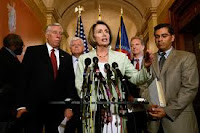The leaders of the 111th session of Congress are working at a feverish pace to complete unfinished business and bills. Many of the lawmakers are well aware that they will not be back, so they are leaving their legacy: be it bad or good. The Democrats have from the beginning had an agenda and a strategy, and time is running out.
 |
| Harry Reid, Democratic Senate Majority Leader |
Senator Harry Reid has threatened the Republicans that he is willing to work until December 30, and get the work completed. Many Republicans and Democrats know that is not realistic, but Reid knows that the tables will be switched in 2011. With the Republicans with more power in the Senate and a majority in the House, Reid wants major bills passed now and not later.
Reid wants to complete an approval of ratification of a nuclear arms treaty with Russia, legislation to repeal the military's "Don't ask, Don't tell" policy, a "package of land, water, and wildlife" bill, the passage of the Dream Act, as well as the confirmation of several presidential nominees. It is obvious that Reid will not get all this done in the next 10 days.
Usually the main reason that the lame duck sessions are so important is to complete its work on the spending or appropriation bills that form the basis of the annual federal budget. President Obama was personally involved in this lame duck session, because if the Bush tax cuts deal was not finalized, all Americans taxes would have increased by at least $2,500.
The Senate passed the Bush tax cuts on Wednesday, December 15, 2010 by a vote of 81-19, and the House approved the measure by a vote of 277-148 on Thursday, December 16, 2010. Without the president getting involved the tax cut bill, it would not have passed so rapidly.
President Obama and congressional Democrats agreed to compromise in their opposition to extending the lower tax rates to the wealthy Americans, and also agreed to a lower estate tax than had been scheduled to take effect. In return, Republicans agreed to extend unemployment benefits with payroll tax cuts and other tax breaks, which conservatives generally opposed as government stimulus measures.
Many political experts believe that this is an indicator of how President Obama will operate with a split Congress, during 112th session. Instead of change, President Obama is talking about compromise, and he is ready to make deals to initiate a bi-partisan conversation and a sharing of power.
At President Obama's 29th bill signing ceremony for the Bush tax cut legislature, there were representatives from both parties at the event. At the signing ceremony President Obama said, "The final product proves when we can put aside the partisanship and political gains, we can get a lot done. If we can keep doing it, if we can keep that spirit, I'm hopeful that we won't just reinvigorate this economy and restore the American dream, I'm also hopeful that we might refresh the American people's faith in the capability of their leaders to govern in challenging times."
The president has acknowledged that he was not completely satisfied with the tax cut deal, but his goal was to get the work done before the deadline. It is obvious that the "to do list" for the 111th Congress will not be completed this year.
 |
| Obama signing another bill |
The work of the 111th Congress will never be completed, because one session carries to the next session and it takes months and years to get new bills operating and implemented.
Check out Roger's other blogs on PRESIDENT OBAMA WATCH at www.presidentobamawatch.wordpress.com








